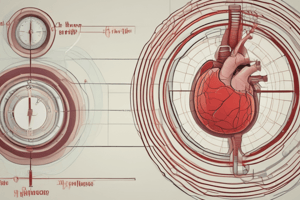Podcast
Questions and Answers
What is the primary reason for the chronic antihypertensive effects of diuretics?
What is the primary reason for the chronic antihypertensive effects of diuretics?
- Increased sodium and water excretion
- Inhibition of the renin-angiotensin-aldosterone system
- Decreased cardiac output
- Reduction in peripheral vascular resistance (correct)
When should diuretics be dosed for optimal efficacy and to minimize side effects?
When should diuretics be dosed for optimal efficacy and to minimize side effects?
- Once daily, in the morning (correct)
- Once daily, in the evening
- Three times daily, morning, noon, and evening
- Twice daily, in the morning and evening
Which of the following side effects is more common with loop diuretics compared to thiazide diuretics?
Which of the following side effects is more common with loop diuretics compared to thiazide diuretics?
- Hypocalcemia (correct)
- Hypokalemia
- Hypercalcemia
- Hyperglycemia
Which patient population is at the greatest risk of developing serious cardiac arrhythmias from diuretic-induced electrolyte imbalances?
Which patient population is at the greatest risk of developing serious cardiac arrhythmias from diuretic-induced electrolyte imbalances?
Which side effect of diuretics is more likely to be problematic for patients with a previous history of gout?
Which side effect of diuretics is more likely to be problematic for patients with a previous history of gout?
What is the typical effect of high doses of thiazide and loop diuretics on fasting glucose and serum cholesterol values?
What is the typical effect of high doses of thiazide and loop diuretics on fasting glucose and serum cholesterol values?
What is the most effective first-line antihypertensive drug class for African American patients?
What is the most effective first-line antihypertensive drug class for African American patients?
Which antihypertensive drug class is less effective at lowering BP in African Americans?
Which antihypertensive drug class is less effective at lowering BP in African Americans?
What is the effect of combining a CCB or thiazide with a β-blocker, ACEI, or ARB in African American patients?
What is the effect of combining a CCB or thiazide with a β-blocker, ACEI, or ARB in African American patients?
What is the risk of angioedema and cough in African Americans compared to whites when taking ACEIs?
What is the risk of angioedema and cough in African Americans compared to whites when taking ACEIs?
How should drug therapy selection be approached for hypertension in African American patients?
How should drug therapy selection be approached for hypertension in African American patients?
What is the recommended approach to using β-blockers in patients with pulmonary disease or peripheral arterial disease (PAD)?
What is the recommended approach to using β-blockers in patients with pulmonary disease or peripheral arterial disease (PAD)?
What is the overall goal of hypertension treatment?
What is the overall goal of hypertension treatment?
What is the primary method used to determine the need for titration and regimen modification in hypertension treatment?
What is the primary method used to determine the need for titration and regimen modification in hypertension treatment?
What is a surrogate target in the context of hypertension treatment?
What is a surrogate target in the context of hypertension treatment?
What is the role of non-pharmacologic therapy in hypertension treatment?
What is the role of non-pharmacologic therapy in hypertension treatment?
What is the specific selection of antihypertensive drug therapy based on?
What is the specific selection of antihypertensive drug therapy based on?
What is the purpose of reducing blood pressure to a goal value in hypertension treatment?
What is the purpose of reducing blood pressure to a goal value in hypertension treatment?
According to the information provided, what is the approximate systolic blood pressure (SBP) reduction associated with reduced salt intake of 1.5 g/day sodium or 3.8 g/day sodium chloride?
According to the information provided, what is the approximate systolic blood pressure (SBP) reduction associated with reduced salt intake of 1.5 g/day sodium or 3.8 g/day sodium chloride?
Which of the following lifestyle modifications is associated with the greatest approximate SBP reduction range?
Which of the following lifestyle modifications is associated with the greatest approximate SBP reduction range?
Which of the following statements about the effects of lifestyle modifications is correct?
Which of the following statements about the effects of lifestyle modifications is correct?
According to the information provided, what is the recommended frequency and duration of aerobic physical activity for reducing blood pressure?
According to the information provided, what is the recommended frequency and duration of aerobic physical activity for reducing blood pressure?
What is the recommended maximum daily alcohol intake for men and women/lighter weight persons, respectively, according to the information provided?
What is the recommended maximum daily alcohol intake for men and women/lighter weight persons, respectively, according to the information provided?
According to the information provided, what should be the general approach to treating hypertension?
According to the information provided, what should be the general approach to treating hypertension?
What is the primary recommendation regarding the influence of comorbid conditions on drug therapy choices?
What is the primary recommendation regarding the influence of comorbid conditions on drug therapy choices?
What is the finding from the systematic review of 15 studies involving 35,000 patients assessing -blocker use?
What is the finding from the systematic review of 15 studies involving 35,000 patients assessing -blocker use?
Which type of antihypertensive agents are associated with higher rates of sexual dysfunction?
Which type of antihypertensive agents are associated with higher rates of sexual dysfunction?
What is the relationship between hypertension, atherosclerotic vascular disease, and erectile dysfunction?
What is the relationship between hypertension, atherosclerotic vascular disease, and erectile dysfunction?
How does diabetes affect the relationship between antihypertensive treatment and erectile dysfunction in hypertensive men?
How does diabetes affect the relationship between antihypertensive treatment and erectile dysfunction in hypertensive men?
Flashcards are hidden until you start studying




